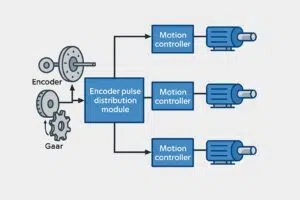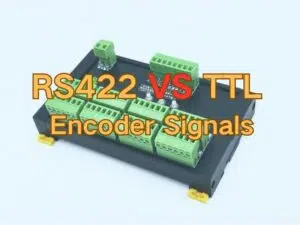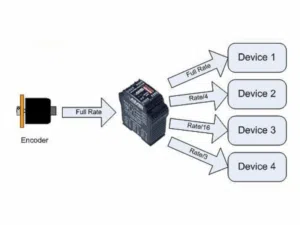What is a bolt type terminal block? It is an essential component in modern electrical and industrial applications, providing secure and reliable connections in high-current environments. These terminal blocks offer robust, long-lasting connections that can handle heavy loads while maintaining stability and safety.
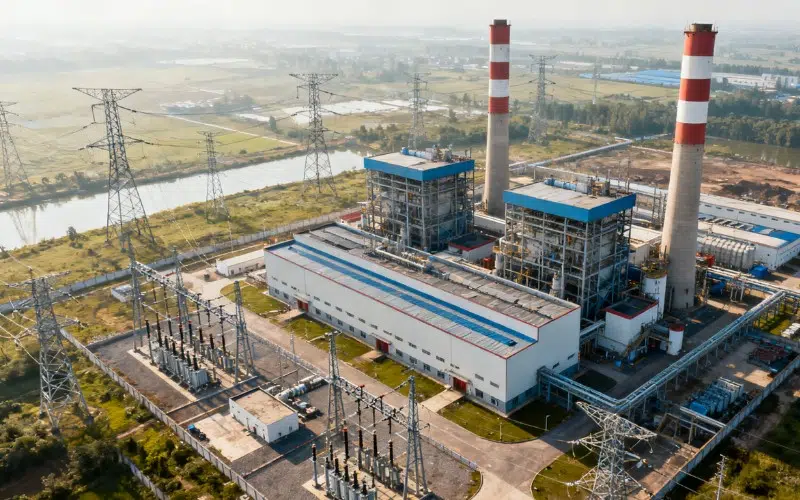
Understanding the features of bolt type terminal block can help engineers and electricians make informed decisions for wiring projects. Whether installing control panels or automating industrial systems, knowing how these blocks function ensures efficient and durable electrical operations.
What is a Bolt Type Terminal Block – Key Takeaways
- Bolt type terminal blocks provide secure, high-current connections that combine mechanical strength with electrical reliability, making them ideal for industrial and automation applications.
- Choosing the right block depends on your needs: use bolt type terminal blocks for high-current, high-vibration, or heavy-duty systems, and consider screw or spring cage terminals for lighter loads.
- Proper installation, including applying the manufacturer-specified torque, ensures safe, stable operation and prevents loose connections or conductor damage.
- Routine maintenance, such as inspecting for loose bolts, corrosion, or worn parts, helps maintain reliability and extends the terminal block’s lifespan.
- Bolt type terminal blocks offer a dependable solution that withstands demanding conditions, and selecting the correct type and rating optimizes wiring performance and long-term system safety.
Part 1 Definition of Bolt Type Terminal Block
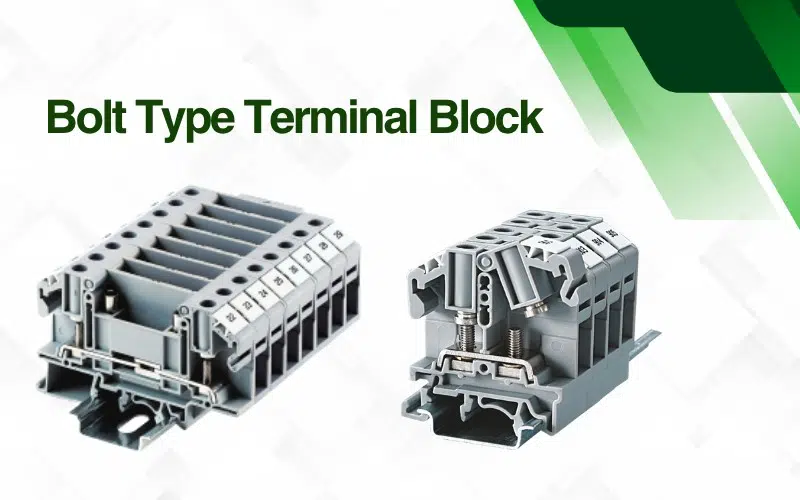
Basic Definition
Maybe you have this question: What is a bolt type terminal block? Actually, they are electrical connectors that secure wires using bolts instead of screws or spring mechanisms. They provide a highly reliable connection, particularly in high-current and industrial applications.
For instance, in a power distribution panel, bolt type terminal blocks can safely carry currents from 10A up to 400A, ensuring consistent performance even under heavy loads. These blocks can be mounted on DIN rails or directly on panels, offering flexibility for various electrical systems.
Key Highlights of Its Definition for You:
- High-current rating ensures robust connections
- Suitable for DIN rail or panel mounting
- Can accommodate multiple conductor sizes
Tips:
If you are new to industrial wiring, start with standard 10–50A blocks before scaling up to high-current applications. Make sure to match the block’s current rating to your load requirements.
Difference from Other Terminal Types
Unlike screw or push-in terminals, bolt type terminal blocks provide superior mechanical stability and vibration resistance. In factory environments with heavy machinery, vibration can loosen traditional screws, causing intermittent electrical failures. Bolt terminals reduce this risk, making them ideal for critical connections such as PLC circuits or high-power feeders.
Tips:
For equipment subject to constant vibration, always choose bolt type terminal blocks for safety and reliability.
Part 2 Overview of Its Structure and Components
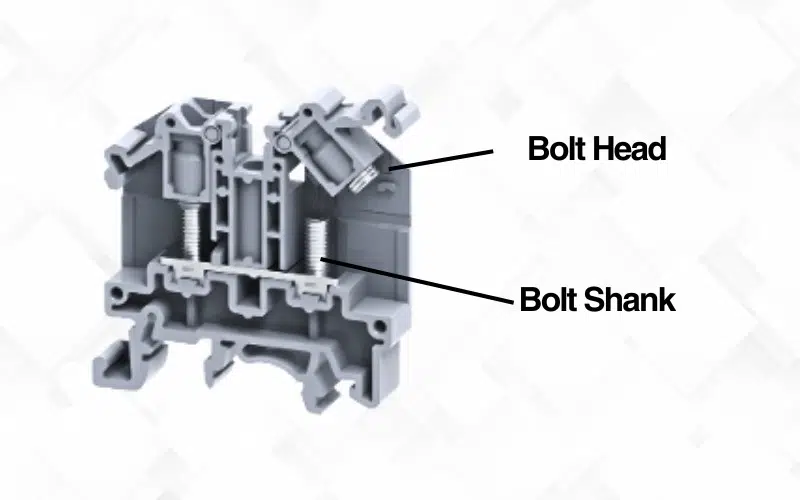
A typical bolt type terminal block consists of a conductive metal strip, an insulated base, and one or more bolts for clamping wires. Optional accessories may include protective covers or DIN rail adapters. The metal strip provides excellent electrical conductivity, while the insulated base prevents short circuits and ensures user safety. Bolts secure conductors firmly, reducing the risk of loosening over time.
Main Features of Bolt Type Terminal Block:
- Metal strip ensures reliable conductivity
- Bolt provides mechanical clamping
- Insulated base enhances safety and durability
Tips:
Before installation, check that the block accommodates your wire size. Standard blocks support 2.5–16 mm² wires, while high-current models can handle up to 50 mm².
Part 3 Mechanical Features and Advantages of Bolt Terminal Block
High Current Capacity
What is a bolt type terminal block? They can carry significantly higher currents than screw terminals, making them suitable for industrial panels or high-power equipment. Some blocks are rated up to 400A and can accommodate multiple conductors simultaneously, ensuring consistent performance for demanding applications.
Advantages of Bolt Type Connections:
- Stable connections for high-current circuits
- Handles multiple wires simultaneously
- Maintains performance under heavy loads
Mechanical Reliability
Bolts prevent loosening caused by vibration or shock, which is crucial for factory machinery or motor-driven equipment. Compared to screw terminals, bolt type blocks reduce maintenance and downtime while maintaining secure electrical contact.

Versatile Installation
Bolt terminal blocks can be mounted on DIN rails or directly on panels, providing flexibility in industrial and commercial setups. This versatility allows engineers to design more compact and organized control panels while maintaining easy access for maintenance.
You can consider this type of terminal block when installing for your projects:
- Supports DIN rail or panel installation
- Reduces installation errors
- Flexible for various industrial configurations
Key Applications of Bolt Terminal Blocks
Bolt type terminal blocks are widely used in industrial, renewable energy, and automation applications. They provide secure, high-current connections and maintain system stability in challenging environments. Below is a summary of typical applications with examples and recommendations:
| Application | Example | Key Recommendation |
| Industrial Control Panels | Factory automation, PLCs, relays, high-current feeders (e.g., 250A blocks) | Ensure blocks match system current; separate by voltage rating if needed |
| Renewable Energy Systems | Solar or wind installations handling inverter or battery currents | Use corrosion-resistant materials like nickel-plated copper for outdoor durability |
| Machinery & Automation | Motors, actuators, or equipment subject to vibration | Regularly check connections; consider lock washers in high-vibration setups |
These examples demonstrate how bolt blocks can enhance safety and reliability across different applications. Selecting the right block and following installation guidelines ensures optimal performance and reduces maintenance issues.
Installation and Maintenance Basics
Proper Installation Steps for Bolt Connectors
Insert the conductor into the slot and tighten the bolt to the manufacturer-specified torque, typically 10 Nm for M6 bolts. By applying the correct torque, you ensure a secure connection without damaging the wire and maintain safe, reliable operation. Proper installation helps you prevent loose connections and keep your system stable in high-current applications.
Maintenance of Bolt Terminal Blocks
Regularly inspect bolt terminal blocks for loose bolts, corrosion, or insulation damage. In high-vibration environments, check quarterly; otherwise, semiannually. Routine maintenance keeps the terminal block operating safely and reliably. If any parts show wear or damage, replace them immediately to maintain system reliability.
FAQ – Bolt Type Terminal Blocks
A1: Bolt type terminal blocks provide stronger clamping, higher vibration resistance, and better performance in high-current applications compared to screw terminals, which may loosen over time.
A2: Yes, but they may be overkill. Screw or spring cage terminals are typically sufficient for circuits under 10A. Bolt terminals are ideal for industrial or high-power applications.
A3: Check the terminal block’s rated conductor range (e.g., 2.5–16 mm² for standard blocks). Ensure the wire size matches the block’s specifications to maintain a secure and safe connection.
A4: No. They are low-maintenance due to strong clamping. However, in high-vibration environments, inspect connections quarterly; otherwise, semiannually is sufficient.
A5: Yes, but choose corrosion-resistant materials such as nickel-plated copper or weatherproof covers to ensure durability in outdoor or high-humidity environments.
Conclusion
Bolt type terminal blocks provide a dependable and durable solution for high-current wiring applications. Understanding what a bolt type terminal block is and how it combines mechanical strength with electrical reliability helps engineers ensure safe and efficient operation.
These blocks are ideal for industrial control panels, automation systems, and other industrial projects. Considering their advantages over other terminal types can help optimize wiring performance and long-term system reliability. Explore our range of terminal blocks today to secure reliable connections for your projects.

